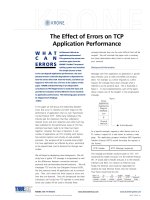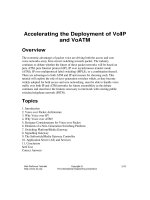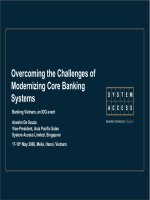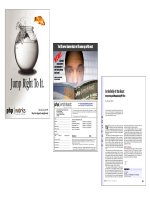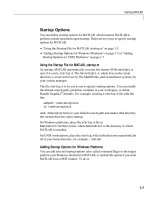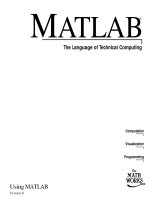Tài liệu In the Shadows of a Fallen Wall docx
Bạn đang xem bản rút gọn của tài liệu. Xem và tải ngay bản đầy đủ của tài liệu tại đây (21.86 MB, 208 trang )
In the Shadows of a Fallen Wall
University of Nebraska Press Lincoln & London
In the Shadows
of a Fallen Wall
© 2013 by the Board of Regents of the University of
Nebraska. All rights reserved. Manufactured in the
United States of America
Parts of this book originally appeared elsewhere. In
chapter 1, the op-ed piece appeared as “Echoes of
America: German School Siege Reects U.S. Inuence”
in The Philadelphia Inquirer on April 30, 2002 (A13).
Chapter 4, “Concrete Details,” appeared in a slightly
dierent form as “Erfurt: Your Guide’s Tour” in
Exquisite Corpse 10 (Fall 2001). Two pieces of ash
ction in Chapter 9, “The Class That Doesn’t Exist
in the Country That Once Did,” appeared elsewhere:
“American, the Beautiful” in Doorknobs and BodyPaint
49 (February 2008) and “The New Economy” under
the title “Stimulus Package” in Word Riot (June 2009).
Chapter 10, “Whatever You Do, Don’t Look Down,”
originally appeared in slightly dierent form in The
Funnel, the Newsmagazine of the German-American
Fulbright Commission 37 no. 2 (Fall 2001). And in
Chapter 11, “In Former Times,” the excerpt by Roberta
Harvey appeared in The Funnel, the Newsmagazine of the
German-American Fulbright Commission 37 no. 1 (Spring
2001).
All photographs, including cover, by the author.
Library of Congress Cataloging-in-Publication Data
Tweedie, Sanford, 1962–
In the shadows of a fallen wall / Sanford Tweedie.
pages cm
Includes bibliographical references.
978-0-8032-7141-8 (pbk.: alk. paper) 1. Tweedie,
Sanford, 1962– 2. Authors, American—Biography.
3. Americans—Germany—Biography. 4. Berlin Wall,
Berlin, Germany, 1961–1989—Biography. 5. Erfurt
(Germany)—Biography. I. Title.
3620.4346 2013
814'.6 —dc23 [B] 2012045748
Set in Lyon Text by Laura Wellington.
For Callan, Tara, and Roberta,
for whom I would climb any wall
And for Manuela and Wilfried,
Thomas and Evy, and all their
children, who shared their lives
with us
The past is never quite past.
—
Nothing ever really disappears.
—
Acknowledgments xi
Introduction: The Walls in Our Heads 1
1. Breaking Down the Wall 15
2. But for the Weather 22
3. Leaving the American Sector 34
4. Concrete Details: Your Guide’s Tour of Erfurt 60
5. s, Autos, and Encounters with the Polizei 66
6. Words Fail Me, Yet Again 89
7. Destinations and Wanderings 105
8. Field without Dreams: Baseball in the Former GDR 122
9. The Class That Doesn’t Exist in the Country That Once
Did 127
10. Whatever You Do, Don’t Look Down 147
11. In Former Times 155
Afterword: Echoes of a Fallen Wall 167
Contents
As with any book, an author’s name appears on the front, but
the words within are created with the help and guidance of
many others.
This book would not exist without the backing of three
institutions: the Fulbright Commission, which granted me
the award allowing me to teach in Germany for a year; the
University of Erfurt, which gave me a home where I could
do that teaching; and Rowan University, which has provid-
ed generous institutional support during the writing of this
book.
In Erfurt, so many clerks, cashiers, Strassenbahn opera-
tors, wait sta, and others made up the majority of our dai-
ly encounters and formed our positive attitudes about peo-
ple living in the city and the former East Germany. But I
would especially like to recognize the kindness shown by
the stas of Albert-Schweitzer-Gymnasium and Haus der
Bunte Träume (House of Colorful Dreams) Kindergarten,
who welcomed and supported our children in ways we could
not have imagined.
At University of Nebraska Press, many helped see this
book through to publication. Heather Lundine, former edi-
tor in chief, helped me to restructure the book and supported
Acknowledgments
xi
the revised manuscript. Bridget Barry stepped in for Heath-
er, providing patience and further guidance. Project editor
Ann Baker and copyeditor Stephen Barnett helped to rene
my words even more.
Several people also read earlier drafts and provided in-
valuable feedback. The late Denise Gess, novelist and teach-
er extraordinaire, read an early version of the book and en-
couraged me not to give up on it. Reviewer Julija Šukys
understood my intentions and vision like no other. Manuela
Linde toiled to make my German somewhat comprehensi-
ble. Finally, the feedback and ideas of my wife, Roberta Har-
vey, are infused in every word.
xii
1
I shall admit my own weakness, at any rate; for I never bring
back home the same character that I took abroad with me.
—
Introduction
The Walls in Our Heads
On the morning of April 26, 2002, my then ve-year-old
daughter and I walked out the back door of our home, load-
ed down with her supplies for kindergarten and mine for
work. We made our way to the car parked in the driveway of
our home in a small southern New Jersey town. After strap-
ping Callan into her seat, I started the engine and turned on
as we waited for Roberta, my wife and Callan’s mom,
to catch up. It was 8:00 a.m.
In his resonant voice and distinctive intonation, Carl Kas-
ell led o the program: “Reports out of Germany say a school
shooting has left two dead.” I knew—not suspected, knew
in a desperate desire not to—that when he went on to iden-
tify the location, it would be Erfurt, the city we had moved
from only eight months prior. Kasell continued: “Police in
Erfurt say that a gunman entered the Gutenberg Gymnasi-
um shortly after eleven a.m. German time and began . . .”
11:00 a.m. in Germany; 5:00 a.m. our time. Three hours ago.
That almost-morning hour when most everyone is asleep. I
had been far into my night’s slumber. Had I stirred? Rolled
over? Possibly.
As Kasell narrated the still-sketchy details about the
shooting—the fatality count would eventually rise to six-
2
teen—I began to better understand what it meant to have
lived in the former German Democratic Republic for nearly
a year and the impact our time on the other side of the now-
drawn-back Iron Curtain had on our lives. My immediate re-
actions were captured in a piece I wrote that morning for the
Philadelphia Inquirer op-ed page:
When I heard the news about the shooting at Gutenberg
School in Erfurt, Germany, my rst concern was for our Ger-
man friend’s daughter who goes to high school in the city.
My second thought was that it is now clear how much Amer-
ica’s inuence has pervaded the once-communist and Sovi-
et-controlled German Democratic Republic.
My rst fear was soon alleviated. As soon as I reached
work, I e-mailed my friend in Erfurt. She replied right away,
assuring me that the incident had not taken place at her
daughter’s school and that her daughter was home safely.
But my second fear did not disappear so quickly. Nor do I
think it ever will. My family spent the 2000–2001 academic
year living in Erfurt while I taught at the University, whose
most famous student was Martin Luther. Erfurt is a beauti-
ful, medieval town of two hundred thousand that was spared
almost completely from World War II bombing. Resplendent
with small community gardens and home to an internation-
al gardening center, Erfurt is known as the “garden city.”
My daughter Tara, who was then thirteen, attended one of
the city’s nine Gymnasiums, combination middle and high
schools for the college bound. She loved it. The students
were kind, caring, and non-cliquish. They embraced Tara as
a friend, despite her barely being able to speak German when
she arrived. Best of all, they were noncompetitive, enjoying
one another’s company. Such attitudes, we would come to
learn, reected those of the larger society. Far from the ste-
3
reotype of gru, no-nonsense Germans, we found eastern
Germans to be friendly, easy-going and fun-loving people.
Yet, the town and the area—indeed all of the former East
Germany—are in transition from a communist to a free mar-
ket society. This is represented by stark contrasts. For exam-
ple, in the middle of our neighborhood of Soviet-designed,
concrete apartment buildings, capable of housing some forty
thousand people, squatted a recently built mall that looked
for all the world like any mall found in the United States. Big
Mercedes share the road with the remaining East German–
era Trabants—small, berglass cars powered by little more
than a lawnmower engine.
And though only a handful of Americans live in the town,
America’s inuence is undeniable. Erfurt is home to McDon-
ald’s, Burger King, Pizza Hut, Woolworth’s and Ford dealer-
ships. Even in German stores, American logos are popular.
American music lls the airwaves.
The contrasts are found in more than just the buildings
and products; they are also found in the people—those who
recall what eastern Germans refer to as “former times” and
those who are too young to remember life under commu-
nism. Indeed, my university students, who tended to range
in age from about twenty to twenty-three years, are the last
of the generation who have any memory of living in the
GDR. Their younger siblings were unable to recall the fall
of the Berlin Wall.
I gave several talks on American youth culture to school
teachers during my stay. To introduce the topic, I would ask
two questions. The rst was, “How much are teens here like
teens in America?” The follow-up question was, “And how
much do you want them to be like teens in America?”
Let me oer a story in response. While living in Erfurt,
we awoke one morning to nd that our car had been stolen.
4
It was recovered by police a few hours later. Riding with the
police to the local garage where the car had been towed, I
asked one of the ocers whom he thought had committed
the crime. “Dumme Jungs,” he responded. Stupid boys. He
then went on to say that the problem with kids today was a
lack of leadership. What he meant was that since the fall of
the Wall, there was no one keeping an eye on the kids; that
the structured and busy lives forced upon people by the East
German government were replaced by nothing; that kids had
too much time to hang out, see what they didn’t have and
imagine the criminal means to get it. Clearly, he was lament-
ing that cradle-to-grave care and oversight provided by the
GDR had disappeared, that “former times” were over.
Robert Steinhäuser, the nineteen-year-old gunman in Fri-
day’s shootings, proved that they are. He reportedly told a
classmate, “One day, I want everyone to know my name and
I want to be famous.” He got his wish. He now becomes the
poster child for the new eastern German, one whose mem-
ory does not include a time when the “e” in “east” was capi-
talized, one who has grown up with the conicting tenets of
Western values. More signicantly, Steinhäuser’s legacy re-
sults from his adoption of methods for coping with the sys-
tem’s pressures that we in the West are far too familiar with.
Dumme Jungs.
When an editor of the op-ed page tried to contact me to say
he planned to run the piece, I was on my way home from
work and, in my pre–cell phone days, missed his call. I didn’t
notice until later than evening his message on the home an-
swering machine saying that I could see the proofs. By then
I gured it was too late to do anything for the morning paper.
Even if I were given the chance to consider the editor’s
changes, I am not sure I would have argued too strongly
5
against them. I don’t think I would have said, “It’s my way
or don’t publish it, Mr. Editor.” While his changes and exci-
sions tightened the piece without altering its tenor, in a move
that I felt made the piece more inammatory, he changed
the beginning and ending. The published opening removed
the rst two paragraphs above and thrust to the front infor-
mation I had included for my byline: “As a Fulbright scholar
during the 2000–2001 school year, I lived in Erfurt, the east-
ern German city where 16 people were slain inside Guten-
berg school Friday. When I heard the news, one of my rst
thoughts was that it is now clear how much America’s in-
uence has pervaded the once-communist former German
Democratic Republic.”
This not only removed my genuine concern for those
whom I feared might have been harmed in the shooting, it
also made me seem as if I were outing my credentials. I
had put them in the byline to explain why I had been in east-
ern Germany, not to wave the award in the reader’s face.
The editor also altered the closing by cutting out the Dumme
Jungs as the last sentence, thus removing my nal condem-
nation of Steinhäuser, the young shooter who turned the
gun on himself after being confronted by a teacher during
his spree. Even the change in title from my “School Shoot-
ing Shows That East Germany Has Now Joined the West” to
“Echoes of America: German School Siege Reects U.S. In-
uence” shifted the agency of the relationship.
Still, when I saw the piece as it was published along with
my e-mail address in the byline, I didn’t anticipate the wrath
that would follow. The morning of publication, I arrived at
1. Following the precedent set in the op-ed piece, I use the lowercase “e” in
“east” and “eastern” to refer to the land formerly known as East Germany.
The capitalized “East” and “East Germany” refers to that era when the Ger-
man Democratic Republic existed.
6
work to my rst e-mail response. It referred to my “inane
screed,” asserted that I was a professor because I wasn’t
“smart enough to get a real job,” and called me a “loser” be-
cause “Never once have you mentioned something leftist/
liberal pansies hate to talk about, ‘personal responsibility’!!”
E-mails continued to arrive throughout the day. Later in
the week, the editorial was reprinted in other newspapers,
and a new wave of responses ensued. After my initial shock
at the personal excoriations evolved into bemusement, I
found that those who took the time to write oered two lines
of counterargument. The rst follows the logic of the letter
above: Your agenda, somehow related to a position in academia
and obviously part of a larger, easily classiable, liberal group-
think, causes you to believe incorrectly that people are social-
ly constructed, that they operate within and against societal
norms and expectations, whereas in reality they have complete
free will. This, the letter writers go on to argue, causes me to
blame American society and its inuence, excusing the indi-
vidual who should be held personally—and singularly—re-
sponsible for his actions. Taken to its extreme, the argument
compares me to terrorists who also blame the United States
for everything that is wrong with the world. “You and Bin
laden [sic] are a pair. Everything is America’s fault,” one e-
mail proclaimed. In a world but a few months removed from
9/11, such comparisons should not have surprised me.
Others, though somewhat less vitriolic, were uncanny
in their resemblance to the rst. One saw me as a “charter
member of the ‘Blame America First’ society” and a “devo-
tee of the ‘It’s Always Someone Else’s Fault’ cult.” This writer
went on to recommend that “you might consider returning
to instruct those unfortunate victims, whom you have de-
termined were better o under a failed Socialist experiment
in East Germany, on the pitfalls of embracing a culture you
7
have so ardently rejected.” Another wrote that I had “abso-
lutely no rational grounds for contending the nutcase shot up
his school because his delicate psyche was bruised by Amer-
ican culture . . . His actions might just as easily have been a
product of child-rearing practices common to your own lib-
eral, socio-ideological class.”
These e-mailers are correct in saying that demonstrating
direct causality between societal standards—be they east
German or American—and a single person is impossible. In
using the word “inuence” in the opening paragraph where
I discuss “how much America’s inuence has pervaded the
once-communist and Soviet-controlled German Democrat-
ic Republic,” I was suggesting in that overly simplied, brief
editorial space that Robert Steinhäuser adopted a Western-
style solution to his situation and that such an act indicates a
shift in eastern Germans’ perspectives that now align them
with western perspectives. If anything, the e-mailers’ free-
will position supports my point. In his famous 1963 “Ich bin
ein Berliner” speech outside Rathaus Schöneberg, Presi-
dent John Kennedy said of Berlin, “What is true of this city
is true of Germany—real, lasting peace in Europe can nev-
er be assured as long as one German out of four is denied
the elementary right of free men, and that is to make a free
choice.” The fall of the Wall provided Steinhäuser his abili-
ty to choose, even if he chose badly.
The logic of the second argument reasons: Germans are
Germans are Germans, and those who once massacred inno-
cents in the world wars are fated to do it again. Robert Stein-
häuser is just the latest incarnation of German evil. Such an
argument relies on a belief in cultural genetics, wherein an
inherited predisposition, in this case toward evil, is passed
down from generation to generation within a society. One
correspondent stated, “Germany needs no lessons from
8
anyone on how to kill innocent people.” Another wrote that
the country that “gave us two world wars and the holocaust
hardly needs inspiration from us for violence.” Yet another
said, “The killer is the heir to the Nazi and Soviet cultures of
mass murder.” Finally, this one even uses a term similar to
my “cultural genetics”: “Since when do Germans need out-
side motivation to commit horrendous acts of violence . . . vi-
olence is just part of their cultural prole.”
Even if cultural genetics—representing the nature side of
this nature vs. nurture dichotomy—holds some credence,
why should we see Steinhäuser, a nineteen-year-old who
spent, at most, six years living under the communist regime,
as a product of this society? Should it not be his elders—those
with much more direct contact with communism and its be-
haviors—who go on shooting sprees? People’s fundamental
values were upended. Many remain conicted by living in
a capitalist marketplace after having been raised in a com-
munist society. They don’t understand how to be capitalists,
whatever that might mean. And because some can’t gure it
out, or have and don’t like what they see, or are too old to be
successfully integrated into the free-market economy, there
are people in eastern Germany who would prefer to see a re-
turn to GDR times. I have spoken with some of them, and
their attitudes are reected in the popularity of former com-
munists in eastern German elections. And for those who la-
ment what has taken place since die Wende—the “turning
point” signifying the beginning of reunication—Steinhäus-
er’s actions provide further evidence that “former times”
were indeed better. See, they say, this massacre wouldn’t
have happened under the old system. It proves that the new
system is unpredictable and dangerous.
While I might concede that either of these lines of rea-
soning—the personal responsibility or the cultural genet-
9
ics argument—carries some validity, when taken together,
they contradict one another. If Robert Steinhäuser’s “cultur-
al prole” as a German led him to go on the shooting spree,
how can he—and only he—be personally responsible for this
incident? If he is a manifestation of German culture, he can-
not also be a youth willfully capable of accepting or rejecting
societal inuences. This also leads to questions about Amer-
ican society: If the violent German culture is so obviously re-
ected in this incident, what do the many more violent and
super-violent crimes in the United States, in schools and in
society at large, say about our own cultural genetics? And,
perhaps more important, what, if anything, can be done
about it if we are culturally predisposed to such violence?
Although both camps of e-mail correspondents reject any
association between our country and the shooting, Germans
themselves do not see it this way. A Time magazine article’s
title—“Germany’s Columbine”—encapsulates the point of
my op-ed piece in two words. In this piece, a German news
anchor states, “It’s the kind of thing you expect to happen in
America.” Echoing this, a German student points out, “This
happens a lot in America, but it’s not just an American thing
anymore.” Or as one student’s mother succinctly puts it:
“We’ve been Americanized.” Having lived in German so-
ciety—or at least on the fringe of it—I felt I could share my
understanding and knowledge of this perspective in the In-
quirer piece. Thus, I included the discussion from the police
ocer as representative of some east Germans’ views. How
ironic—and perhaps revealing of their biases—that many of
those who e-mailed attributed those words to me.
The solution to this nature vs. nurture debate lies, not sur-
prisingly, somewhere between the two dichotomies. To gain
a more complete perspective, one should look at the situation
not in terms of either/or but both/and. We need both to hold
10
Steinhäuser responsible for his actions and to acknowledge
that society plays a role in such a crime. I see his actions as
indicative of, not representative of, eastern Germany’s situ-
ation. My editorial suggested that Steinhäuser’s actions pro-
vide a demonstrable signal that the former East Germany
has somehow turned a corner. Perhaps I would go so far to
say that the shooting serves as an indicator that eastern Ger-
mans have bought into Western views.
And isn’t this what we wanted when the Wall fell? We
did not expect West Germans to adopt East German (that
is, communist) values, but that West German culture would
ow eastward. I do not claim that capitalism is inherently
evil. I am not trying to defend the young man’s cowardly ac-
tions. I am not arguing for a return to the GDR—the Stasi
was certainly no Cub Scout troop. But to pretend that Amer-
ican values are, like people themselves, subject to a border
check and can be forced to remain in the United States is na-
ïve and isolationist. Would those who argue against Amer-
ica’s sphere of inuence extending beyond our borders also
presume that the classics should not be studied, that the
ideas found in Greek and British writings should be turned
away at our borders? Would they postulate that terrorists’
(re)actions are completely unrelated to the spread of Amer-
ican values and inuence? The e-mailer who claimed, “You
and Bin laden are a pair. Everything is America’s fault” was
at least partially correct. While I take umbrage at the infer-
ence, I do believe that the terrorist Osama bin Laden would
not have existed without an America to direct his destruc-
tive anger toward, in the same way Moby Dick spurs Ahab’s
maniacal actions.
I will also forward another comparison that, were this an
opinion piece, might inspire a new wave of e-mail rants: In
their aggregate, the three dozen responses to my editorial
11
point out how the Internet has created its own form of sur-
veillance, one that echoes the East German Stasi. Those who
publish in a digitally mediated world—either through corpo-
rate channels such as the Philadelphia Inquirer or through
blogging and social networking—face a multitude of un-
known and anonymous watchers who are only too eager to
police and judge. Just look at the comments section follow-
ing any controversial topic. Our perceptions of what we’re
willing to share have changed in an Internet world; our will-
ingness to impose our perspectives on others has also shift-
ed. And while the vast network of East German informants
who spied on colleagues, friends, and even spouses may have
reached one in ve citizens at its zenith, these people had to
be recruited by the Stasi; cybersociety encourages anyone
and everyone to fulll this role.
I was reassured that my perspective was not completely
o base when I received an e-mail from my friend Manuela
Linde, whose school-age daughter, Anne-Katrin, I initially
worried about when I heard the news of the Erfurt shooting.
Manuela wrote:
Almost one week after this tragedy happened, everybody
here tries to nd out reasons why. People do not talk about
anything else—in town, on the tram, at work. Tomorrow is
the public funeral service on Domplatz. People never have
met there for a sad reason, at least since I have lived in Er-
furt. I am quite sure that there will be more people than ever
before, even more than on Dec 31, 1999. It certainly will be
broadcasted all over the world.
Of course, there is not only one reason for why this could
happen. The explanations go in three directions. First, how
such a young boy could legally buy these lethal weapons
(they already discuss to tighten up the German law). Sec-
12
ond, that violence is present everywhere and every day on
, in computer games, on the Internet. Third, Thuringia
is the only German state in which pupils do not receive any
kind of school leaving certicate if they fail the Abitur. Due
to this, the pressure of passing the Abitur is enormous.
Your article made clear how I have not heard anybody seek-
ing the explanation about the non-existent future prospects
of the young generation or the contrasts after the Wall came
down. Perhaps it does not t in the election campaign that
has already started half a year before the elections. I do not
know if the pupils in gymnasiums have already completely
recognized their situation. It is the parents who either have
too much work so that they do not have time for the prob-
lems of their children or they are unemployed and are so
busy with their own problems that they do not listen to their
children either. There was a survey among young people be-
low age 25 last year. 70% said they will denitely leave East-
ern Germany during the next years. About 15% were unde-
cided and only 15% said they would stay. What a future!
It is good to hear your view on the things since you are an in-
sider and outsider at once.
I found this last sentence heartening. For the year that I
lived in Erfurt, I felt myself an outsider in the east. My in-
ability to speak German well and my temporary status made
me feel removed from society. Yet, we ventured to Erfurt for
exactly that reason. My wife and I were somehow attract-
2. The German education system tracks students based on ability, starting in
fth grade. Graduates of a Gymnasium take the Abitur exam, which permits
them to then study at German universities. When Steinhäuser was expelled
from Gutenberg Gymnasium, he was left with no opportunity to obtain a de-
gree. The Thuringian government has since rectied this situation.

